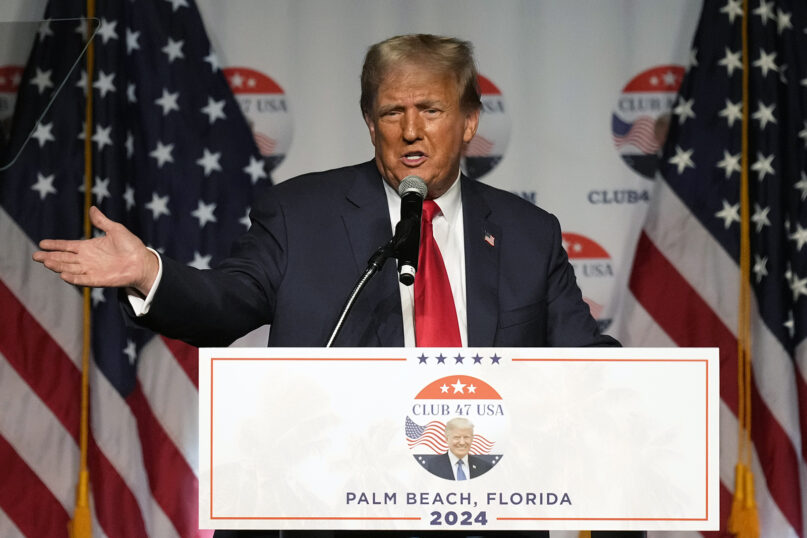(Sightings) — As Republicans continue to contend over their party’s presidential nomination — if “contend” is the right word for “jockeying to see who will be the last candidate knocked off by Donald Trump” — Trump himself continues to provide opportunities for white American evangelicals to tell us who they are.
Not long ago, these evangelicals told us that a candidate’s being a Christian was important to them, so they expressed reservations about Mitt Romney, a faithful Mormon who was thus beyond the pale for some evangelicals — the Church of Jesus Christ of Latter-day Saints is not, in their lexicon, a Church of Jesus Christ at all, but a cultic counterfeit of the true faith.
These evangelicals told us that being a person of good moral character was important, so they vehemently opposed Bill Clinton as a mendacious adulterer — and then Hillary Clinton as, among other faults, his enabling wife and partner in crime.
Support for Trump called these avowals into question. A man who can hardly spell “B-I-B-L-E,” and who brags not just of sexual conquests but of sexual abuse, makes Mitt Romney look like a Sunday School teacher and Bill and Hillary Clinton look like Baptist deacons.
Still, we were told, Trump will work to limit abortion, and evangelicals are deeply pro-life. As Myriam Renaud reported in Sightings, however, abortion hasn’t been as important to evangelicals as they have claimed, while markers of white Christian nationalism were central to their support of Trump. Immigration (“Guard our borders!”), law and order (“Fund the police!”), economic protectionism (“America first!”) and resistance to a progressive agenda across the board (“Protect our kids!”) loomed largest as evangelical concerns.
Now, it seems, Trump apparently doesn’t hate abortion after all. His recent comments suggesting he might support a via media, or a middle path, on the issue, including the prospect of cooperating with, of all people, actual Democrats, predictably provoked denunciation from the right. It did not, however, provoke as much as one might expect. Journalists have noted, in fact, the mealy-mouthed responses, or even outright silence, from individuals and organizations who signal their pro-life credentials but who seem to place other matters much higher on the scale of political priorities.
For many observers, especially those who recognize that global evangelicalism does not share the same characteristics as American evangelicalism, this apparent hypocrisy demands explanation. How can evangelicals not only defy biblical teachings, but also their own stated convictions, by embracing Trumpism?
George Marsden’s now-classic 1980 study “Fundamentalism and American Culture” shows us the roots of white Christian nationalism in a generation of evangelicals alarmed by increasing incursions into the “righteous empire” they had governed for a century. America was being lost, they feared, to evolutionary theory, dismissiveness toward the Bible and liberal theology, with communism looming as a growing political threat. If fundamentalists can be tersely defined as angry, because fearful, evangelicals, then fundamentalism’s militancy makes sense.
It makes sense today on an even broader scale among an even broader consensus of white evangelicals in the United States. Afraid of permanent and widespread job loss, afraid of a popular culture that ignores their values when it doesn’t openly mock them and afraid of immigration and multiculturalism making the United States less recognizable — it is no wonder they support a bully happy to articulate their rage in furious bursts, even if not in coherent speeches.
Another element of evangelical identity, however, deserves to be mentioned: an insider/outsider paradox. Since John Winthrop encouraged proto-evangelicals — Puritans — to show the Old World what a righteous empire would look like as the Arbella sailed toward what would become the Massachusetts Bay Colony, white American evangelicals have tended, as have Americans generally, to see themselves as exceptional.
This attitude plays out in the present case in that white American evangelicals simultaneously view themselves as alienated from mainstream American culture as represented in the main institutions of American life while also remaining the true custodians of American authenticity.
Evangelicals see themselves as exceptional in both respects: as not typical of American society as it currently is governed by loathsome elites, and as surpassing that society in virtue. What passes as “normal” therefore doesn’t apply to such exceptional people who are on an exceptional mission: to make America great again as a seamless, integral and truly vital component of the overarching objective, claiming the whole world for the Kingdom of God.
Evangelicals, after all, have made heroes of those who have smuggled Bibles behind the Iron Curtain, who have sought to evangelize tribes that met them with arrows and who have engaged in bait-and-switch campaigns closer to home, such as “study skills seminars” offered on college campuses or “neighborhood clubs” hosted in summertime backyards that conclude with an unadvertised gospel call.
The ultimate end of winning souls justifies a sometimes-startling variety of means. One might wonder to what extent this tradition of pragmatic ethical bargaining has enabled evangelicals to support Trump.
Evangelical support for Trump continues to be wildly inconsistent with some basic Christian values. It is also, however, consistent with a combination of fear and exceptionalism — along with a flexible pragmatism — that has been part of the story of American evangelicalism going back to its 17th-century roots.
(John G. Stackhouse Jr. is the Samuel J. Mikolaski professor of religious studies at Crandall University in Moncton, Canada, and author of “Why You’re Here: Ethics for the Real World.” This commentary originally appeared in Sightings, a publication of the Martin Marty Center for the Public Understanding of Religion at the University of Chicago Divinity School. The views expressed do not necessarily represent those of Religion News Service.)





